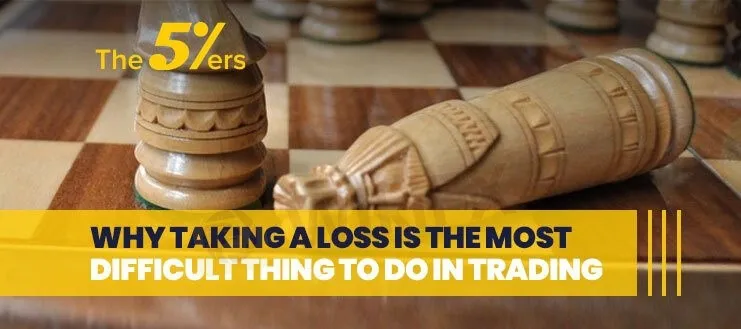WHY TAKING A LOSS IS THE MOST DIFFICULT THING TO DO IN TRADING
Abstract:Losses are part of trading, but how do you feel when taking a loss? Does your stomach churn and heart palpitate? The feeling after a loss can linger for minutes, hours, and sometimes days. Taking a loss is definitely not as fun as taking home the trophy.

Taking a loss is the hardest job on earth
Losses are part of trading, but how do you feel when taking a loss? Does your stomach churn and heart palpitate? The feeling after a loss can linger for minutes, hours, and sometimes days. Taking a loss is definitely not as fun as taking home the trophy. But if we, as traders, can understand why it is so much more difficult to take a loss in our profession rather than to take a loss in another profession – we may be able to understand and accept the situation more easily.
The tactics used to win trades
The profession of trading is often being compared to athletes in competitive sports since both are skills of performance. Besides the many similarities existing between trading and professional sports, there is one key difference that makes trading much harder to master. That is the losing part.
Owning responsibility for our trades
In sports, losing is well defined by time and place, by the rules, by the referee, and by the fact that the opponent only played better than you did. Here, it is the trader‘s responsibility to stamp the loss. To be clearer, it is the trader’s decision about if they are ready to finally surrender and when they would like to do so.
Egos getting in the way of trading
The human instinct is to fight. We all want to be on the winning side. Evolution has built up our minds to think that we should do everything in our capacity to win. Our ego is part of this mechanism.
Either deciding to surrender to your instincts every day or maybe a few times a day – which is counter-intuitive to human nature and this is why it makes this so difficult to maintain. We also see many traders who would allow their losses to grow and be eaten up by big chunks of their accounts. We are simply not programmed to surrender as part of growing up.
Sacrificing trade losses for our ego
The game of chess teaches us that we are able to make tactical sacrifices in battle to achieve winnings. We might give away the queen in order to guard the king or trap the opponent to win the game. As traders, we allow taking losses to be a part of our sacrifices. However, the value of the loss is more abstract and less unambiguous than you would think. We see this in chess, where a player knows which tools will remain available even after you have made the decision of sacrifice.
Sole trader
In trading, there is no opponent that can contribute to your decision to surrender. You work independently and take the winnings and losses independently also. The right time for traders to surrender could be now or later, whereas, in a chess game, the player has to make their tactical decisions right on the spot.
Trading – 90% challenge, 10% comfort
Even though traders have the tools and knowledge of how to trade well, once you are in a trade, you are left vulnerable to the mercy of the market, and all you can do is – be in or out.
How long in? How long out? The answer is only in the aftermath. Choosing the time to surrender can put a positive spin on things also, as making your own time to accept your loss almost prepares you mentally because you know what to expect from around the corner.
The irony of being counter-intuitive
Trading is known to be counter-intuitive, so what you may think is the right time to surrender may not be right. Once traders are in a losing situation, they can only decide to surrender or not to surrender. Its their choice to use their counterintuition to either take that loss or not, and for better or worse.
Is this less difficult than knowing that your opponents may force you out of the game at any moment? The answer may be… not really. It is very difficult for traders because they still have to rely solely on making that pivotal decision to surrender.
Redirecting your thought pattern
It‘s not the only aspect that contributes to the trader’s immense difficulty with losses, and it is the ego and self-awareness that comes into play with trading success. When traders are in a losing situation, they can do nothing about it. Although losses are part of trading, they have to redirect their thinking and ego to focus more on their successes and less on their losses. This is what makes trading more challenging in a unique way.
Losses are part of trading
We do not like to be wrong. Accepting that we are wrong is one of the most difficult things to do. But in trading, accepting this will save you thousands of dollars, and its actually the best thing you can do for yourself and your trading account.
Learn to accept trade losses, learn from them, and move forward.

Read more

WikiFX Elite Club Focus | Lance: Trust Is the Result of Long-Term Actions Accumulated Over Time
WikiFX Elite Club Focus is a monthly publication specially created by the WikiFX Club for its members. It highlights the key individuals, perspectives, and actions that are truly driving the forex industry toward greater transparency, professionalism, and sustainable development.

WikiFX Elite Club Focus | Mohamed Lewaa: Trust Is Built on Verification, Not Feelings
WikiFX Elite Club Focus is a monthly publication specially created by the WikiFX Elite Club for its members. It highlights the key figures, perspectives, and actions that are truly driving the forex industry toward greater transparency, professionalism, and sustainable development.

SkyLine Guide 2026 Thailand — Official Launch of the Judge Panel Formation!
The formation of the SkyLine Guide 2026 Thailand judge panel has officially begun. This year’s selection brings important upgrades to both the evaluation mechanism and participation approach, further emphasizing the role of local perspectives and authentic investor experiences within the judging framework.

WikiFX Elite Club Spotlight | Lê Minh Phươn on Trust as the Invisible Bridge
WikiFX Elite Club Focus is a monthly publication created exclusively for members of the WikiFX Elite Club. It spotlights the individuals, ideas, and actions that are genuinely driving the forex industry toward greater transparency, professionalism, and long-term sustainability.
WikiFX Broker
Latest News
CBN Bolsters Forex Liquidity: Resumes BDC Sales as Reserves Hit $47 Billion
China’s "Deposit Migration" Myth Debunked: A Gradual Shift, Not a Flood
Theos Markets Review 2026: Is this Forex Broker Legit or a Scam?
INVESTIZO Review: Profit Cancellation Claims, Withdrawal Denials & Poor Customer Support
AssetsFX Review : Read This Before You Put Money In it
DeltaFX Broker: No Regulation Exposed
Is Stonefort Legit Company? Understanding the Risks
Mazi Finance Regulatory Status: A Complete Guide to Its Licenses and High-Risk Warnings
Warsh Likes It Hot, And Will Move The Fed's Inflation Target To 2.5-3.5%
datian Review: Examining Slippage and Forced Liquidation Allegations Against the Broker
Rate Calc

